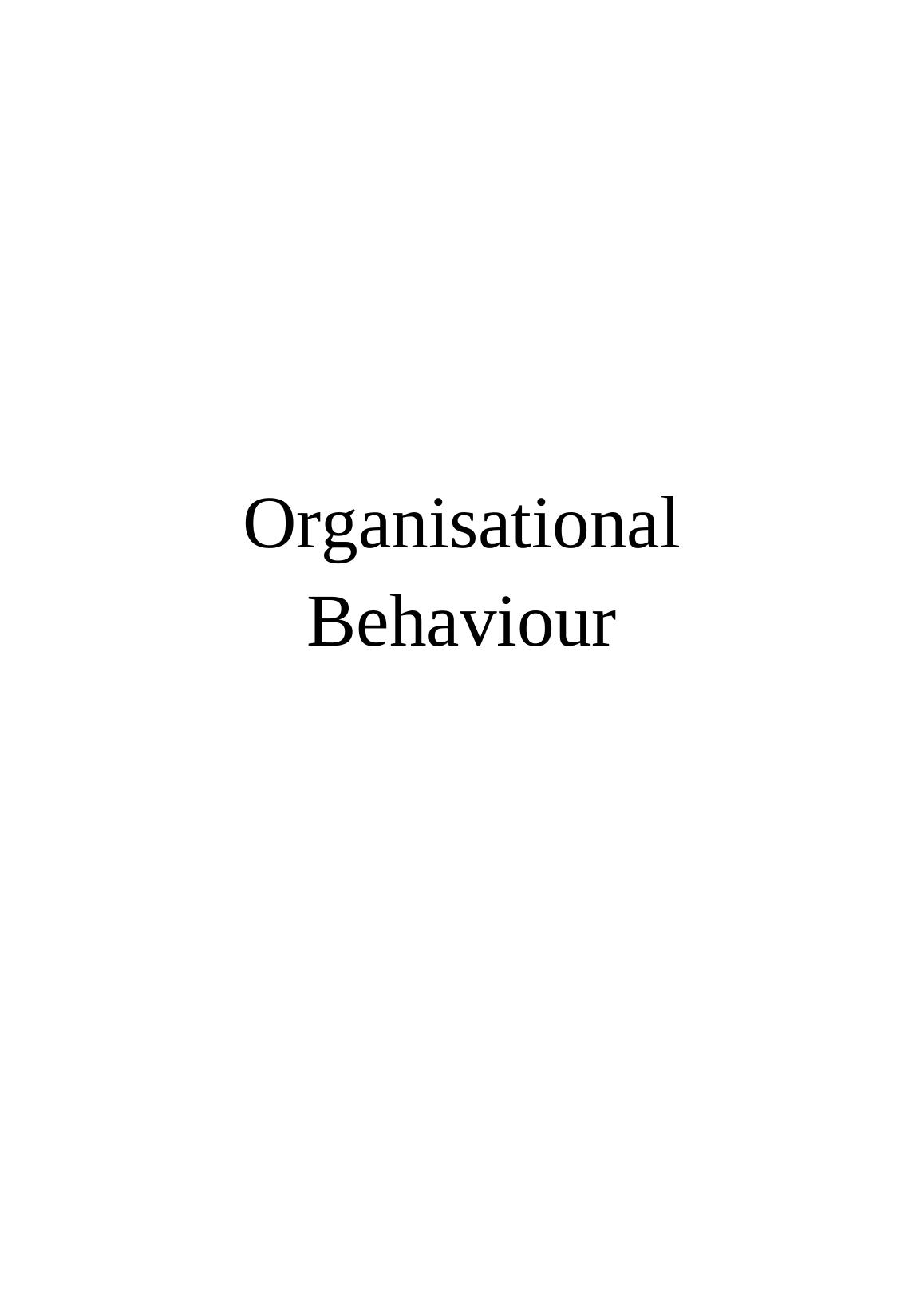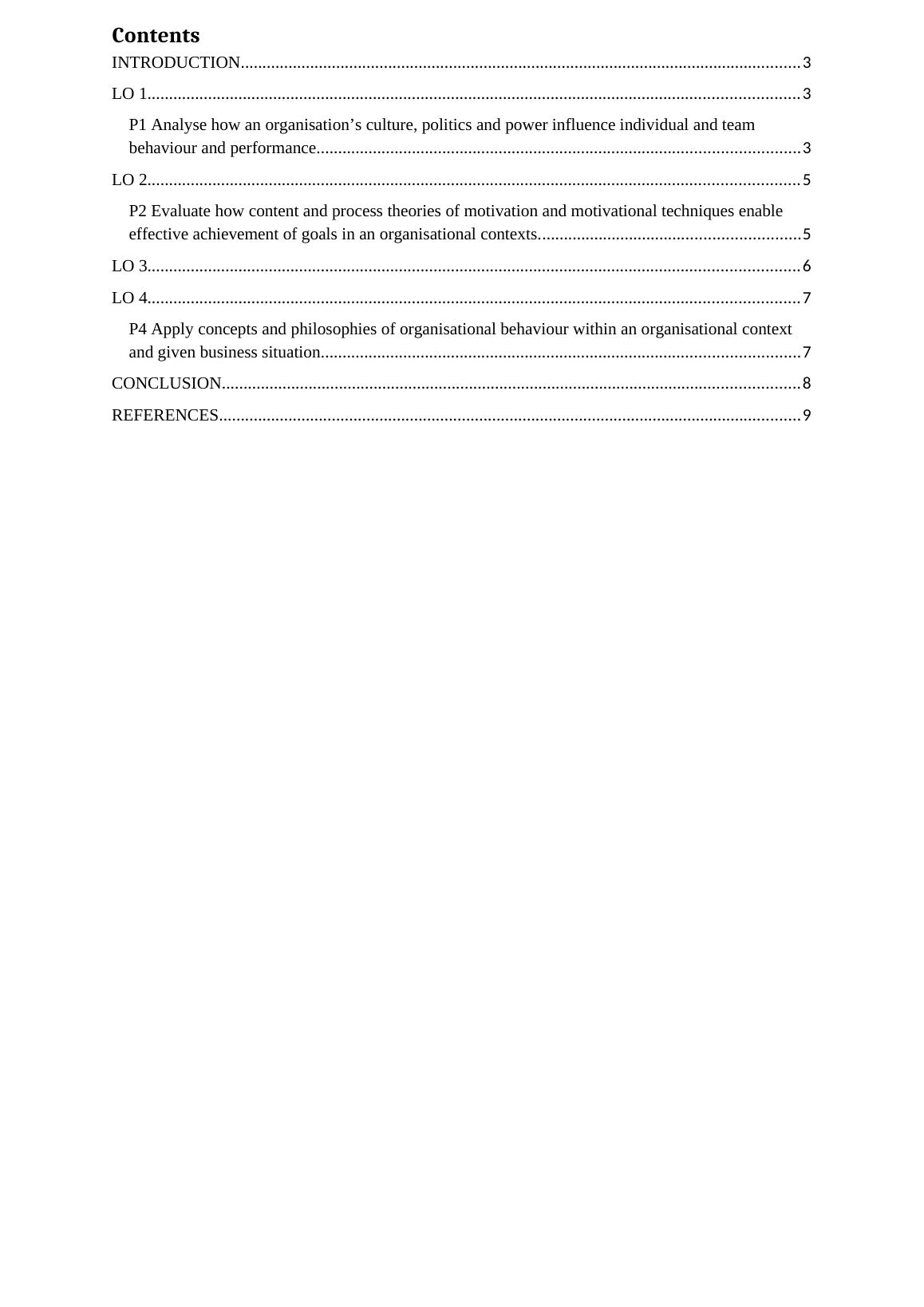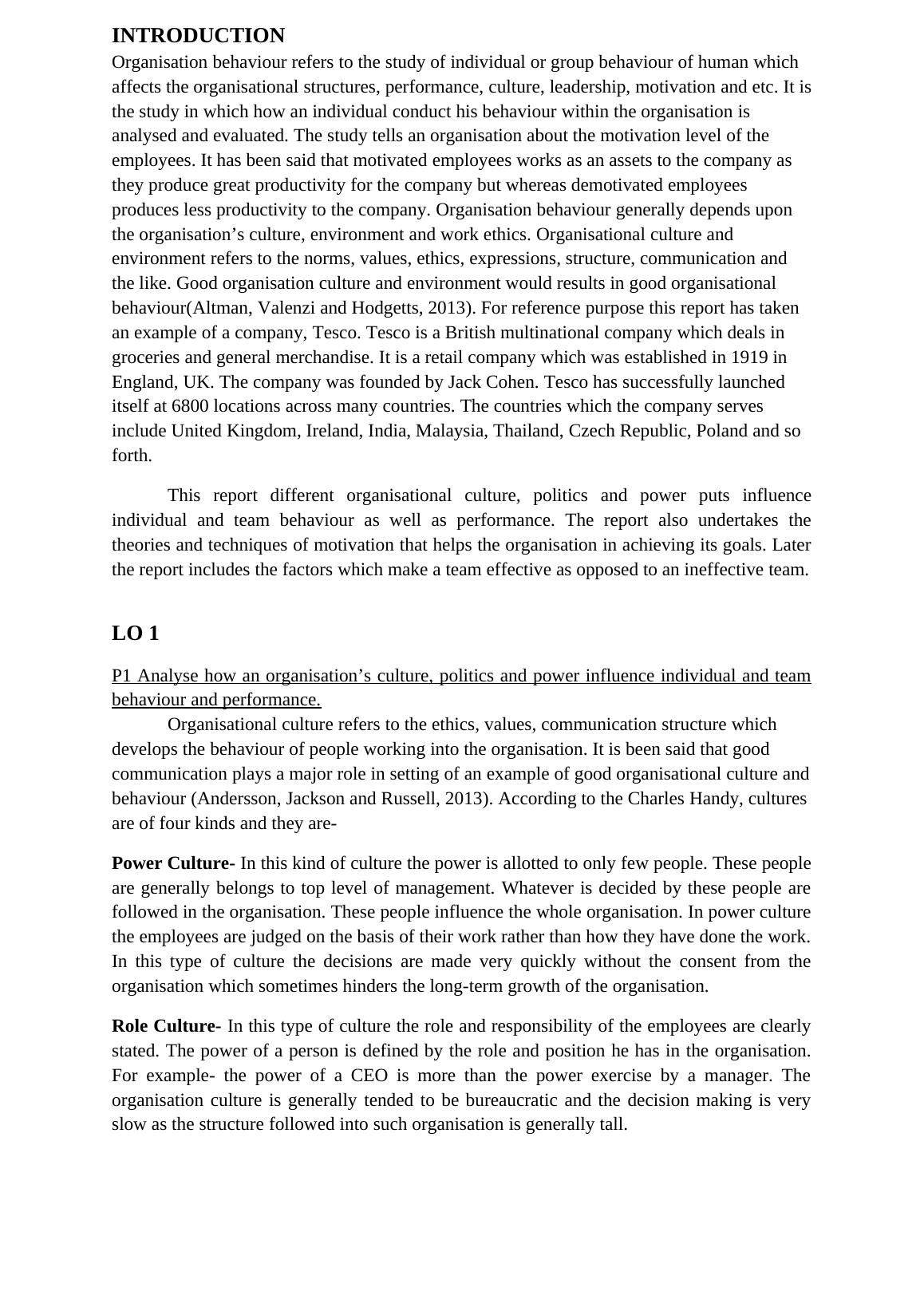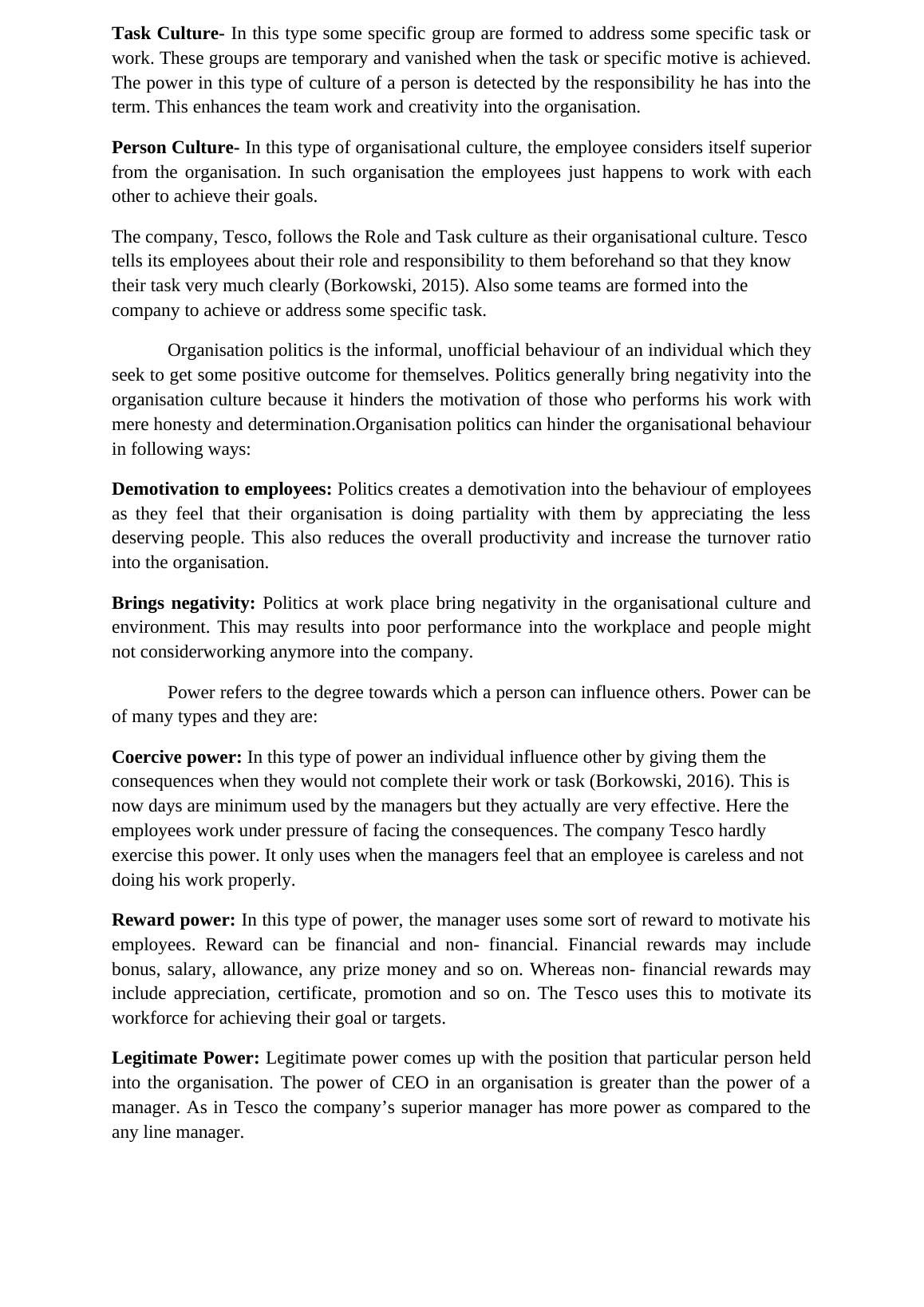Influence of Organisational Culture, Politics, and Power on Behaviour and Performance
15 Pages3401 Words70 Views
Added on 2023-01-12
About This Document
This report analyzes how an organization's culture, politics, and power influence individual and team behavior and performance. It also evaluates how content and process theories of motivation enable effective achievement of goals in an organizational context.
Influence of Organisational Culture, Politics, and Power on Behaviour and Performance
Added on 2023-01-12
ShareRelated Documents
Organisational
Behaviour
Behaviour

Contents
INTRODUCTION.................................................................................................................................3
LO 1......................................................................................................................................................3
P1 Analyse how an organisation’s culture, politics and power influence individual and team
behaviour and performance...............................................................................................................3
LO 2......................................................................................................................................................5
P2 Evaluate how content and process theories of motivation and motivational techniques enable
effective achievement of goals in an organisational contexts............................................................5
LO 3......................................................................................................................................................6
LO 4......................................................................................................................................................7
P4 Apply concepts and philosophies of organisational behaviour within an organisational context
and given business situation..............................................................................................................7
CONCLUSION.....................................................................................................................................8
REFERENCES......................................................................................................................................9
INTRODUCTION.................................................................................................................................3
LO 1......................................................................................................................................................3
P1 Analyse how an organisation’s culture, politics and power influence individual and team
behaviour and performance...............................................................................................................3
LO 2......................................................................................................................................................5
P2 Evaluate how content and process theories of motivation and motivational techniques enable
effective achievement of goals in an organisational contexts............................................................5
LO 3......................................................................................................................................................6
LO 4......................................................................................................................................................7
P4 Apply concepts and philosophies of organisational behaviour within an organisational context
and given business situation..............................................................................................................7
CONCLUSION.....................................................................................................................................8
REFERENCES......................................................................................................................................9

INTRODUCTION
Organisation behaviour refers to the study of individual or group behaviour of human which
affects the organisational structures, performance, culture, leadership, motivation and etc. It is
the study in which how an individual conduct his behaviour within the organisation is
analysed and evaluated. The study tells an organisation about the motivation level of the
employees. It has been said that motivated employees works as an assets to the company as
they produce great productivity for the company but whereas demotivated employees
produces less productivity to the company. Organisation behaviour generally depends upon
the organisation’s culture, environment and work ethics. Organisational culture and
environment refers to the norms, values, ethics, expressions, structure, communication and
the like. Good organisation culture and environment would results in good organisational
behaviour(Altman, Valenzi and Hodgetts, 2013). For reference purpose this report has taken
an example of a company, Tesco. Tesco is a British multinational company which deals in
groceries and general merchandise. It is a retail company which was established in 1919 in
England, UK. The company was founded by Jack Cohen. Tesco has successfully launched
itself at 6800 locations across many countries. The countries which the company serves
include United Kingdom, Ireland, India, Malaysia, Thailand, Czech Republic, Poland and so
forth.
This report different organisational culture, politics and power puts influence
individual and team behaviour as well as performance. The report also undertakes the
theories and techniques of motivation that helps the organisation in achieving its goals. Later
the report includes the factors which make a team effective as opposed to an ineffective team.
LO 1
P1 Analyse how an organisation’s culture, politics and power influence individual and team
behaviour and performance.
Organisational culture refers to the ethics, values, communication structure which
develops the behaviour of people working into the organisation. It is been said that good
communication plays a major role in setting of an example of good organisational culture and
behaviour (Andersson, Jackson and Russell, 2013). According to the Charles Handy, cultures
are of four kinds and they are-
Power Culture- In this kind of culture the power is allotted to only few people. These people
are generally belongs to top level of management. Whatever is decided by these people are
followed in the organisation. These people influence the whole organisation. In power culture
the employees are judged on the basis of their work rather than how they have done the work.
In this type of culture the decisions are made very quickly without the consent from the
organisation which sometimes hinders the long-term growth of the organisation.
Role Culture- In this type of culture the role and responsibility of the employees are clearly
stated. The power of a person is defined by the role and position he has in the organisation.
For example- the power of a CEO is more than the power exercise by a manager. The
organisation culture is generally tended to be bureaucratic and the decision making is very
slow as the structure followed into such organisation is generally tall.
Organisation behaviour refers to the study of individual or group behaviour of human which
affects the organisational structures, performance, culture, leadership, motivation and etc. It is
the study in which how an individual conduct his behaviour within the organisation is
analysed and evaluated. The study tells an organisation about the motivation level of the
employees. It has been said that motivated employees works as an assets to the company as
they produce great productivity for the company but whereas demotivated employees
produces less productivity to the company. Organisation behaviour generally depends upon
the organisation’s culture, environment and work ethics. Organisational culture and
environment refers to the norms, values, ethics, expressions, structure, communication and
the like. Good organisation culture and environment would results in good organisational
behaviour(Altman, Valenzi and Hodgetts, 2013). For reference purpose this report has taken
an example of a company, Tesco. Tesco is a British multinational company which deals in
groceries and general merchandise. It is a retail company which was established in 1919 in
England, UK. The company was founded by Jack Cohen. Tesco has successfully launched
itself at 6800 locations across many countries. The countries which the company serves
include United Kingdom, Ireland, India, Malaysia, Thailand, Czech Republic, Poland and so
forth.
This report different organisational culture, politics and power puts influence
individual and team behaviour as well as performance. The report also undertakes the
theories and techniques of motivation that helps the organisation in achieving its goals. Later
the report includes the factors which make a team effective as opposed to an ineffective team.
LO 1
P1 Analyse how an organisation’s culture, politics and power influence individual and team
behaviour and performance.
Organisational culture refers to the ethics, values, communication structure which
develops the behaviour of people working into the organisation. It is been said that good
communication plays a major role in setting of an example of good organisational culture and
behaviour (Andersson, Jackson and Russell, 2013). According to the Charles Handy, cultures
are of four kinds and they are-
Power Culture- In this kind of culture the power is allotted to only few people. These people
are generally belongs to top level of management. Whatever is decided by these people are
followed in the organisation. These people influence the whole organisation. In power culture
the employees are judged on the basis of their work rather than how they have done the work.
In this type of culture the decisions are made very quickly without the consent from the
organisation which sometimes hinders the long-term growth of the organisation.
Role Culture- In this type of culture the role and responsibility of the employees are clearly
stated. The power of a person is defined by the role and position he has in the organisation.
For example- the power of a CEO is more than the power exercise by a manager. The
organisation culture is generally tended to be bureaucratic and the decision making is very
slow as the structure followed into such organisation is generally tall.

Task Culture- In this type some specific group are formed to address some specific task or
work. These groups are temporary and vanished when the task or specific motive is achieved.
The power in this type of culture of a person is detected by the responsibility he has into the
term. This enhances the team work and creativity into the organisation.
Person Culture- In this type of organisational culture, the employee considers itself superior
from the organisation. In such organisation the employees just happens to work with each
other to achieve their goals.
The company, Tesco, follows the Role and Task culture as their organisational culture. Tesco
tells its employees about their role and responsibility to them beforehand so that they know
their task very much clearly (Borkowski, 2015). Also some teams are formed into the
company to achieve or address some specific task.
Organisation politics is the informal, unofficial behaviour of an individual which they
seek to get some positive outcome for themselves. Politics generally bring negativity into the
organisation culture because it hinders the motivation of those who performs his work with
mere honesty and determination.Organisation politics can hinder the organisational behaviour
in following ways:
Demotivation to employees: Politics creates a demotivation into the behaviour of employees
as they feel that their organisation is doing partiality with them by appreciating the less
deserving people. This also reduces the overall productivity and increase the turnover ratio
into the organisation.
Brings negativity: Politics at work place bring negativity in the organisational culture and
environment. This may results into poor performance into the workplace and people might
not considerworking anymore into the company.
Power refers to the degree towards which a person can influence others. Power can be
of many types and they are:
Coercive power: In this type of power an individual influence other by giving them the
consequences when they would not complete their work or task (Borkowski, 2016). This is
now days are minimum used by the managers but they actually are very effective. Here the
employees work under pressure of facing the consequences. The company Tesco hardly
exercise this power. It only uses when the managers feel that an employee is careless and not
doing his work properly.
Reward power: In this type of power, the manager uses some sort of reward to motivate his
employees. Reward can be financial and non- financial. Financial rewards may include
bonus, salary, allowance, any prize money and so on. Whereas non- financial rewards may
include appreciation, certificate, promotion and so on. The Tesco uses this to motivate its
workforce for achieving their goal or targets.
Legitimate Power: Legitimate power comes up with the position that particular person held
into the organisation. The power of CEO in an organisation is greater than the power of a
manager. As in Tesco the company’s superior manager has more power as compared to the
any line manager.
work. These groups are temporary and vanished when the task or specific motive is achieved.
The power in this type of culture of a person is detected by the responsibility he has into the
term. This enhances the team work and creativity into the organisation.
Person Culture- In this type of organisational culture, the employee considers itself superior
from the organisation. In such organisation the employees just happens to work with each
other to achieve their goals.
The company, Tesco, follows the Role and Task culture as their organisational culture. Tesco
tells its employees about their role and responsibility to them beforehand so that they know
their task very much clearly (Borkowski, 2015). Also some teams are formed into the
company to achieve or address some specific task.
Organisation politics is the informal, unofficial behaviour of an individual which they
seek to get some positive outcome for themselves. Politics generally bring negativity into the
organisation culture because it hinders the motivation of those who performs his work with
mere honesty and determination.Organisation politics can hinder the organisational behaviour
in following ways:
Demotivation to employees: Politics creates a demotivation into the behaviour of employees
as they feel that their organisation is doing partiality with them by appreciating the less
deserving people. This also reduces the overall productivity and increase the turnover ratio
into the organisation.
Brings negativity: Politics at work place bring negativity in the organisational culture and
environment. This may results into poor performance into the workplace and people might
not considerworking anymore into the company.
Power refers to the degree towards which a person can influence others. Power can be
of many types and they are:
Coercive power: In this type of power an individual influence other by giving them the
consequences when they would not complete their work or task (Borkowski, 2016). This is
now days are minimum used by the managers but they actually are very effective. Here the
employees work under pressure of facing the consequences. The company Tesco hardly
exercise this power. It only uses when the managers feel that an employee is careless and not
doing his work properly.
Reward power: In this type of power, the manager uses some sort of reward to motivate his
employees. Reward can be financial and non- financial. Financial rewards may include
bonus, salary, allowance, any prize money and so on. Whereas non- financial rewards may
include appreciation, certificate, promotion and so on. The Tesco uses this to motivate its
workforce for achieving their goal or targets.
Legitimate Power: Legitimate power comes up with the position that particular person held
into the organisation. The power of CEO in an organisation is greater than the power of a
manager. As in Tesco the company’s superior manager has more power as compared to the
any line manager.

End of preview
Want to access all the pages? Upload your documents or become a member.
Related Documents
Organizational Behaviour: Culture, Politics, and Powerlg...
|10
|2618
|20
The Impact of Culture, Power and Politics on Organisational Behaviour and Performancelg...
|14
|3849
|82
Organisational Behaviour: Influence of Culture, Politics, and Power on Individual and Team Behaviourlg...
|13
|4248
|41
Influence of Organizational Culture, Power, and Politics on Team Behavior and Performancelg...
|15
|4862
|73
Individual and Team Behaviour: Impact of Culture, Power and Politicslg...
|17
|4706
|55
Determining the Influence of Politics, Culture, and Power on Team Behavior and Performancelg...
|17
|5526
|28
